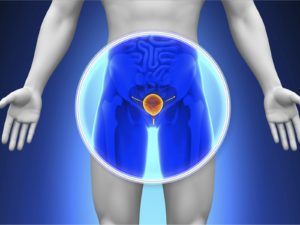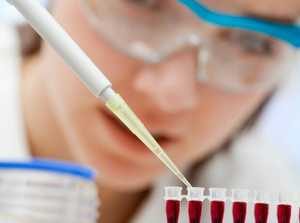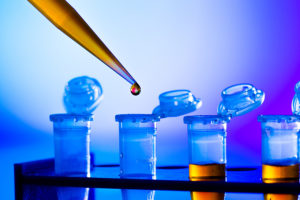Castration-Resistant Prostate Ca Samples
Bay Biosciences provides high quality, clinical grade fresh frozen Castration-Resistant Prostate cancer (CRPC) tumor tissue specimens with matching cryogenically preserved sera (serum), plasma, and peripheral blood mononuclear cells (PBMC’s) biofluid samples from CRPC patients to a valued pharmaceutical customer for research, diagnostics, development and drug discover.

Prostate Cancer Overview
Cancer begins when healthy cells in the prostate change and grow out of control, forming a tumor. A tumor can be cancerous or benign. A cancerous tumor is malignant, meaning it can grow and spread to other parts of the body. A benign tumor means the tumor can grow but will not spread.
Prostate cancer is somewhat unusual when compared with other types of cancer. This is because many prostate tumors do not spread quickly to other parts of the body. Some prostate cancers grow very slowly and may not cause symptoms or problems for years or ever. Even when prostate cancer has spread to other parts of the body, it often can be managed for a long time, allowing men even with advanced prostate cancer to live with good health and quality of life for many years. However, if the cancer cannot be well controlled with existing treatments, it can cause symptoms like pain and fatigue and can sometimes lead to death. An important part of managing prostate cancer is monitoring it for growth over time, in order to find out if it is growing slowly or quickly.
Castration Resistant Prostate Cancer (CRPC)
Castration-Resistant Prostate Cancer (CRPC) is a type of advanced prostate cancer that keeps growing or spreading even when the amount of testosterone levels in the body is reduced to very low levels from hormone therapy. Many early-stage prostate cancers need normal levels of testosterone to grow, but castrate-resistant prostate cancer do not.
Hormone therapy is also called testosterone depleting therapy or androgen deprivation treatment (ADT) and lowers your natural testosterone level. It is given through medicine or surgery to most men with prostate cancer to stop the testosterone which fuels the growth of prostate cancer. That fuel includes male hormones or androgens like testosterone. Typically, prostate cancer stops growing with hormone therapy, at least for some time. If the cancer cells begin to outsmart hormone treatment, they can grow even without testosterone. If this happens, the prostate cancer is considered CRPC.
Castration-Resistant Prostate cancer may or may not have any symptoms. CRPC Symptoms depend on the size of new growth and where the cancer has spread in the body. With advanced CRPC disease, without treatment patients may have problems passing urine or see blood in the urine. Some CRPC patients may feel tired, weak or lose weight. When prostate cancer spreads to bones, patient may have bone pain.
Signs and Symptoms Prostate Cancer
Following are the signs and symptoms of prostate cancer may include:
- Frequent urination
- Weak or interrupted urine flow or the need to strain to empty the bladder
- The urge to urinate frequently at night
- Blood in the urine
- Blood in the seminal fluid
- New onset of erectile dysfunction
- Pain or burning during urination
- Discomfort or pain when sitting, usually caused by an enlarged prostate
Other noncancerous conditions of the prostate, such as BPH or an enlarged prostate, can cause similar symptoms. Or, the cause of a symptom may be a different medical condition that is also not related to cancer. Urinary symptoms also can be caused by an infection of the bladder or other medical conditions.
If cancer has spread outside of the prostate gland, the patient may experience the following symptoms:
- Pain in the back, hips, thighs, shoulders, or other bones
- Fever
- Swelling or fluid buildup in the legs or feet
- Unexplained weight loss
- Fatigue
- Change in bowel habits, diarrhea or constipation
Risk Factors Prostate Cancer
The following factors may raise a man’s risk of developing prostate cancer:
- Age: The risk of prostate cancer increases with age, especially after age 50. More than 80% of prostate cancers are diagnosed in people who are 65 or older.
- Race: African American men in the United States, and other men of African ancestry, are diagnosed with prostate cancer more than men of other races. Black men are more likely to die from prostate cancer than white men.
- Family History: Prostate cancer that runs in a family, called familial prostate cancer, makes up about 20% of all prostate cancers. This type of prostate cancer develops because of a combination of shared genes
and shared environmental or lifestyle factors. - Genetics: Genes that may carry an increased risk of developing prostate cancer include HPC1, HPC2, HPCX, CAPB, ATM, FANCA, HOXB13 and mismatch repair genes.
- Diet: Obesity is associated with many cancers, including prostate cancer.
Diagnosis of Prostate Cancer
In addition to a physical examination following tests may be used to diagnose prostate cancer:
- PSA Test: PSA is a type of protein released by prostate tissue that is found in higher levels in a man’s blood. Levels can be raised when there is abnormal activity in the prostate, including prostate cancer, BPH, or inflammation of the prostate.
- Free PSA Test: Free PSA is found in the bloodstream and is not bound to proteins. A standard PSA test measures total PSA, which includes both PSA that is and is not bound to proteins. The free PSA test measures the ratio of free PSA to total PSA. Knowing this ratio can sometimes help find out if an elevated PSA level is more likely to be caused by a malignant condition like prostate cancer.
- Digital Rectal Exam (DRE): Digital rectal exam (DRE) is performed to find abnormal parts (cancer) of the prostate by feeling the size of your prostate gland.
- Biomarker Tests: Biomarker tests for prostate cancer include the 4Kscore, which predicts the chances someone will develop high-risk prostate cancer, and the Prostate Health Index (PHI), which predicts the chances someone will develop prostate cancer.
If the PSA or DRE test results are abnormal, then further tests will be used to make a diagnosis of cancer. Many tests can suggest that cancer is present, but only a biopsy can make a definite diagnosis.
- Prostate Biopsy: To get a tissue sample, a surgeon most often uses transrectal ultrasound (TRUS) and a biopsy tool to take very small slivers of prostate tissue. Biopsy specimens will be taken from several areas of the prostate to get multiple tissue samples. This is done to make sure that a good sample is taken for examination.
- MRI Fusion Biopsy: An MRI fusion biopsy combines an MRI scan with transrectal ultrasound (TRUS), an MRI fusion biopsy can better identify areas that are more likely to be cancerous than other methods.
- PCA3 Test: The Prostate CAncer gene 3 (PCA3) assay looks for the PCA3 gene in urine. Unlike PSA, which can be found in anyone with a prostate, the PCA3 gene is greatly expressed in those with prostate cancer.
- Transrectal ultrasound (TRUS): A doctor inserts a probe into the rectum that takes a picture of the prostate using sound waves that bounce off the prostate. Transrectal ultrasound procedure is usually done at the same time as a biopsy.

Detailed clinical data, biomarker information including PSA, DRE, pathology annotations, Gleason score and patients history associated with the Castration-Resistant Prostate Cancer samples is provided to a valued customer for drug discovery, development and research.
Bay Biosciences is a global leader in providing researchers with high quality, clinical grade, fully characterized human tissue samples, bio-specimens and human bio-fluid collections from cancer (tumor) tissue, cancer sera (serum), cancer plasma, cancer PBMC and human tissue samples from most other therapeutic areas and diseases.
Bay Biosciences maintains and manages it’s own bio-repository, human tissue bank (biobank) consisting of thousands of diseased samples (specimens) and from normal healthy donors available in all formats and types. Our biobank procures and stores fully consented, deidentified and institutional review boards (IRB) approved human tissue samples and matched controls.
All our human human tissue collections, human specimens and human bio-fluids are provided with detailed samples associated patient’s clinical data. This critical patient’s clinical data includes information relating to their past and current disease, treatment history, lifestyle choices, biomarkers and genetic information. Patient’s data is extremely valuable for researchers and is used to help identify new effective treatments (drug discovery & development) in oncology, other therapeutic areas and diseases. This clinical information is critical to demonstrate their impact, monitor the safety of medicines, testing & diagnostics, and generate new knowledge about the causes of disease and illness.
Bay Biosciences banks wide variety of human tissue samples and biological samples including cryogenically preserved -80°C, fresh, fresh frozen tissue samples, tumor tissue samples, FFPE’s, tissue slides, with matching human bio-fluids, whole blood and blood derived products such as serum, plasma and PBMC’s.
Bay Biosciences is a global leader in collecting and providing human tissue samples according to the researchers specified requirements and customized, tailor made collection protocols. Please contact us anytime to discuss your special research projects and customized human tissue sample requirements.
Bay Biosciences provides human tissue samples (human specimens) from diseased and normal healthy donors; including peripheral whole-blood, amniotic fluid, bronchoalveolar lavage fluid (BAL), sputum, pleural effusion, cerebrospinal fluid (CSF), serum (sera), plasma, peripheral blood mononuclear cells (PBMC’s), saliva, Buffy coat, urine, stool samples, aqueous humor, vitreous humor, kidney stones, renal calculi, nephrolithiasis, urolithiasis and other bodily fluids from most diseases including cancer. We can also procure most human bio-specimens and can do special collections and requests of human samples that are difficult to find. All our human tissue samples are procured through IRB approved clinical protocols and procedures.
In addition to the standard processing protocols Bay Biosciences can also provide human plasma, serum, PBMC bio-fluid samples using custom processing protocols, you can buy donor specific sample collections in higher volumes and specified sample aliquoting from us. Bay Biosciences also provides human samples from normal healthy donors, volunteers, for controls and clinical research, contact us Now.
日本のお客様は、ベイバイオサイエンスジャパンBay Biosciences Japanまたはhttp://baybiosciences-jp.com/contact/までご連絡ください。



